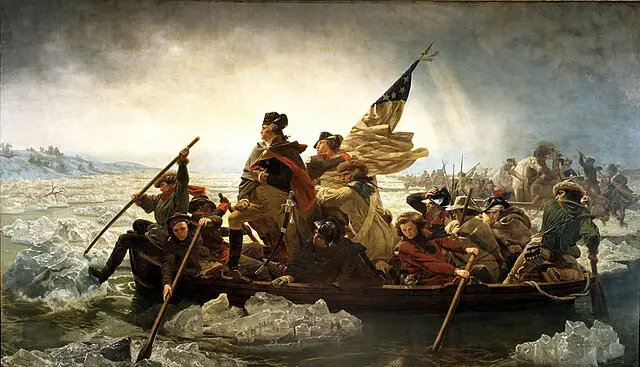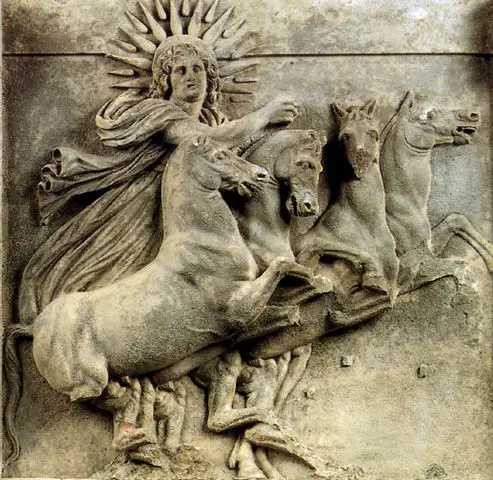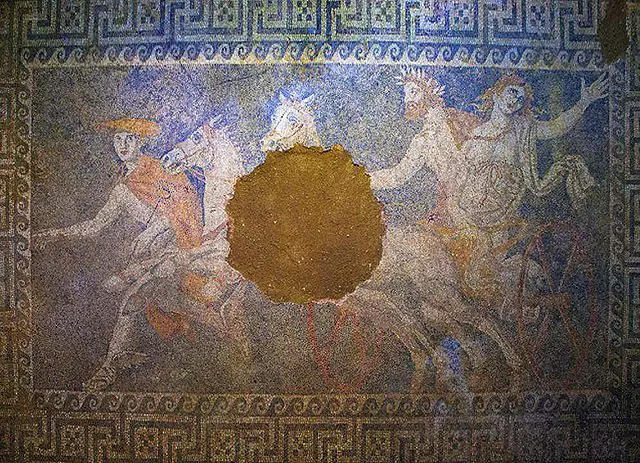| Dates | 69-96 AD |
| Further Reading | The 5 Roman Emperors Of The Julio-Claudian Dynasty |
With the end of the Year of the Four Emperors in 69 AD rose the Flavian Dynasty. There were 3 emperors that belonged to this dynasty and each one of them is important to Roman history in their own way.
The 3 emperors of the Flavian Dynasty are Vespasian, Titus, and Domitian. Each of these 3 emperors were drastically different from each other and helped to set up the Roman empire to grow in power over the next two centuries. Due to this each emperor of the Flavian Dynasty is extremely important to understanding Roman history.
The Flavian Dynasty as a whole is remembered for their massive public building campaigns and expansion of the Empire. Below you will find sections detailing each emperor and their importance to Roman history. In each of the sections there is a further reading section should you want to find out more.
Here at The History Ace I strive to publish the best history articles on the internet. If at the end you enjoyed this article then consider subscribing to the free newsletter and sharing around the web.
Without further ado, here are the 3 emperors of the Flavian Dynasty and their importance to Roman history.
The 1st Emperor of the Flavian Dynasty: Emperor Vespasian (69-79 AD)
| Born | 17th of November, 9 AD |
| Died | 23rd of June, 79 AD |
| Famous Quote | “Money does not stink” |
| Known For | Establishing peace after Year of Four Emperors, coming from an equestrian family, very successful military commander and starter of Flavian Dynasty |
| Region of World | Rome, Italy, 1st century AD |
| Further Reading | Emperor Vespasian: The 3 Things He Is Best Known For |
The founding member of the Flavian dynasty was Emperor Vespasian. In 68 AD Emperor Nero would die without an heir. This would lead to 4 emperors all claiming that they had rights to rule the Empire.
Out of these 4 emperors the last one standing was Emperor Vespasian. As such he became the 9th emperor of the Roman Empire. In doing this Emperor Vespasian also founded the Flavian Dynasty as the next two emperors would come from his direct family.
Importance of Emperor Vespasian
Emperor Vespasian is Important to Roman history for 3 reasons.
First, Emperor Vespasian solved the succession crisis after the death of Nero. Emperor Nero was loved by the people of Rome but was hated among the nobility. During the Year of the Four Emperors the Roman nobility and people would cast out or not support the other claimants to the throne. Vespasian is important because he managed to unify the people, army, and Roman Senate.
Second, Emperor Vespasian came from humble backgrounds. Vespasian was the first emperor to come from ‘relative poverty’ and rise up to become the Emperor. Vespasian’s father was a debt collector from an Italian village on the outskirts of Rome. Vespasian is important because he marks a shift in the social permeability in the Roman Empire.
Third, Emperor Vespasian started a series of massive building projects to glorify Rome. Under the Julio-Claudian Dynasty the emperors of Rome built massive structures to their own honor first and the people second. Vespasian is important because he built large scale public buildings dedicated to the Roman people. An example of this can be seen in Roman Colosseum which construction was started upon during Vespasian’s rule.
Personality of Vespasian
Vespasian’s personality is fascinating when compared to previous Roman emperors.
Unlike Nero, Tiberius, Claudius, and Caligula, Emperor Vespasian was patient and tolerant with all the Roman people. He let people ridicule him and tended to judge fairly during trials.
On top of this Vespasian recognized the importance of writers. He personally took great interest in and personally funded Roman’s who wrote history and pursued ‘science.’ A prime example of this can be seen in Pliny the Elder’s Natural History where he dedicates the work towards “his friend Vespasian.”
As such the personality of Vespasian was admirable considering the previous emperors.
The 2nd Emperor Of The Flavian Dynasty: Emperor Titus (79-81 AD)
| Born | 30th of December, 39 AD |
| Died | 13th of September, 81 AD |
| Famous Quote | “As for the emperors who are dead and gone, they will avenge themselves in case anyone does them a wrong, if in very truth they are demigods and possess any power.” |
| Known For | Completing his fathers massive building projects, helping the sufferers of Mount Vesuvius, halting treason trials. |
| Region of World | Rome, Italy, 1st century AD |
| Further Reading | Emperor Titus: The 3 Things That Made Titus A Good Emperor |
Vespasian would pass away peacefully in 79 AD after a decade of rule. His oldest son Titus would inherit the Roman throne as the 10th emperor of Rome.
Emperor Titus is a fascinating character. He is the closest thing to a saint in the form of a Roman emperor that the early empire would experience. Ancient sources depict Emperor Titus as serving only to make every Roman’s day better.
As such Emperor Titus was loved by all Roman’s except his brother who was next in line for the Roman throne.
Emperor Titus would pass away peacefully after only 3 years of rule.
Importance Of Emperor Titus
Even though he only ruled for 3 years Emperor Titus is important to the study of the Roman Empire for 3 major reasons.
First, Titus would work diligently to complete the massive building projects started by his father Vespasian. Titus dedicated the Colosseum and the Baths of Titus to the people of Rome and his father. After the Flavian Dynasty Roman Emperors would continue the practice of building large scale public works buildings.
Second, Titus set a precedent of using massive amounts of Imperial funds to help those less fortunate. Previous Emperors such as Augustus and Tiberius used imperial funds to help in natural disasters but not at this scale. Emperor Titus would experience 3 huge natural disasters; the eruption of Mount Vesuvius, the Fire of Rome in 80 AD, and a plague outbreak in the city in 80 AD. Titus would use a considerable amount of Imperial funds to aid both the people and senators of Rome.
Third, Titus put a halt to treason trials during his reign. This is by far one of the most important things that Titus did. The first thing that Emperor Titus promised to the Roman people was that during his reign no Roman would be held for Treason unjustly. As you might imagine this made Titus extremely popular among the Roman Senate who immediately proclaimed him a god after his passing in 81 AD.
Personality Of Emperor Titus
As I previously stated Emperor Titus was the closest thing to a saint that the people of Rome had experienced so far.
Most Emperors were cruel and sought to rule with an iron fist. They would harshly punish people sometimes without any just cause. Emperor Caligula for example would have random spectators thrown into gladiatorial games to fight wild animals.
Titus took a radically different approach to being the Roman Emperor. He gave back provinces and gave the Roman Senate more power to control the Empire. Historians have debated if this was a veneer by later historians or if Titus really voluntarily gave up power.
Historians tend to agree that Titus was genuinely a nice emperor. He would often bear ridicule of people openly and encourage them to speak their mind. Further, he allowed writers to publish unfavorable accounts of his and other emperors’ reigns, which unfortunately do not survive in their entirety to the modern day.
Since Titus only ruled for 3 years it’s difficult to say what his personality was exactly like. However, since the Roman Senate immediately deified him we can generally say he was loved by all Romans during his life.
The 3rd Emperor Of The Flavian Dynasty: Emperor Domitian
| Born | 24th of October, 51 AD |
| Died | 18th of September, 96 AD |
| Known For | Revaluing the Roman currency, reducing power of the Roman Senate, embarking on a massive building program, several large scale wars, creating a Roman renaissance. |
| Region of World | Rome, Italy, end of 1st century AD |
| Further Reading | Emperor Domitian: The 3 Reasons He Is Remembered Today |
After Emperor Titus passed away from a mysterious illness in 81 AD his younger brother Domitian would become the 11th emperor of Rome.
Emperor Domitian was the 3rd and final member of the Flavian Dynasty. His style of leadership and rule differed completely from his older brother’s. Often he would be at odds with the Roman Senate who were used to Emperor Titus’s hands off approach to government.
Domitian on the other hand is known today to be a ruthless but efficient autocratic emperor who set the Empire up to expand both economically and geographically over the next couple centuries.
Emperor Domitian would die without a direct heir in 96 AD. His chief advisor Nerva would start a new dynasty called the Nerva-Antonine Dynasty.
Importance Of Emperor Domitian
Emperor Domitian would rule for nearly 15 years. During this time period he would begin the process of setting up the Empire to expand as well as begin to remove the power from the Roman Senate. There are 3 reasons why Emperor Domitian is important to Roman history.
First, Emperor Domitian would revalue the Roman currency to combat inflation. Under the Julio-Claudian Dynasty the Roman Empire would experience massive inflation in order to finance the emperor’s lavish lifestyle. Out of the 5 Julio-Claudian Emperors two of them almost bankrupted the entire empire. Domitian would bring the silver content of the Roman denarius from 90% up to 98%.
Second, Domitian would drastically reduce the power of the Roman Senate. When coming to power Domitian would begin to systematically start eliminating the power of the Roman Senate in favor of imperial advisors. Domitian liked this as the entire government was under his control. However, this would also destabilize the Roman government.
Third, much like his older brother and father Emperor Domitian would engage on a series of large scale building projects. Over the course of Domitian’s reign he would build a massive 50 public structures, much of which has been lost to us. However, these public structures would set a precedent of subsequent emperors donating to the glory of the Roman people.
Personality Of Emperor Domitian
Emperor Domitian was hated by the Roman Senate. After his death in 96 AD the Roman Senate would have every aspect of his reign erased from history. Luckily for us however the actions of his rule would be preserved in documents and architecture.
We know that Domitian had a domineering, micromanaging, authoritative yet fair personality. He favored taking direct control over all aspects of the state and many historians theorize that he might have been a workaholic.
However, we do know that Domitian hated the established aristocracy of Rome. This was more than likely due to his childhood in and around the city of Rome where he was looked down upon due to his fathers social status.
Because of this Vespasian would delineate all Imperial duties to people he directly controlled. This created an incredibly efficient style of government but it relied upon a workaholic emperor who was willing to administer such a monolithic government.
As such Emperor Domitian’s personality was more like a micromanaging small business owner today. As you could imagine the Roman Senate did not like this.
Conclusion
There you have it; an entire article dedicated to the Flavian Dynasty and their importance to Roman history.
We don’t know much about the Flavian Dynasty. They only served for a brief period of time but they are fascinating. They built some of the most iconic buildings in Rome. Further, they restructured the economic system of Rome and were generally more approachable then the previous emperors.
Here at The History Ace I strive to publish the best history articles on the internet. If you enjoyed this article then feel free to sign up for the free newsletter and share around the internet.
Further, you can check out some of the other articles below.
-
How The American Revolution Changed The World

Here is how the American Revolution changed the world. Many people are not aware of just how important this event actually was.
-
Why The Roman People Loved Chariot Racing

Why did the Roman people love chariot racing? Well it all comes down to these 3 reasons.
-
The Design and Color of Roman Chariots

What was the design and color of Roman Chariots? Were they faster or slower then normal chariots? Well here is everything!
Sincerely,
Nick